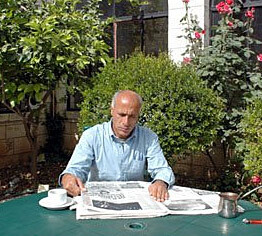Glasgow University 15 December 2004

Mordechai Vanunu reads a newspaper in the grounds of the Anglican cathedral of St George’s, East Jerusalem. (Meir Vanunu)
University students claimed that they wanted Vanunu as Rector to show that they support basic human rights, and that they oppose weapons of mass destruction.
Principal of the University, Sir Muir Russell, said: “The election of Mr Vanunu demonstrates the diverse and international concerns of Glasgow students. It is our hope that he will be able to support the student body in the way that they desire.”
The Rector of the University of Glasgow holds a special position, and the office - that of a person elected by the students whose task is to represent them - is found only in the four so-called ‘ancient’ universities of Scotland.
Mr Vanunu will hold office for three years, representing the students in diverse ways, which can include chairing the University Court. The Rector’s participation in events is entirely voluntary and depends on their own availability and choice. The role is principally as spokesperson and representative for student issues. The Rector is not active in University strategy or policy-making.
Historically Rectors have largely been drawn from politics, including Gladstone, Disraeli, Balfour, Bonar Law, and the French President, Poincaré.
Recent University of Glasgow Rectors have included children’s entertainer Johnny Ball, pop singer Pat Kane, trade unionist Jimmy Reid, sports commentator Arthur Montford and South African activist Winnie Mandela. Mordechai Vanunu will replace actor and comedian Greg Hemphill who was elected to the Rectorship in 2001.
More Information
Related Links